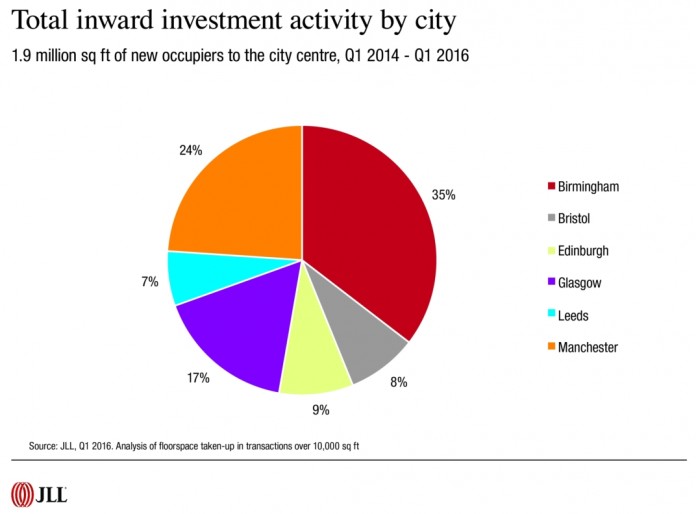Research from leading property consultancy JLL has revealed that Birmingham has attracted more inward investment into its city centre in the last two years than its major UK rivals.
In square footage terms, the Second City has outperformed Manchester, Leeds, Bristol, Glasgow and Edinburgh according to JLL’s Big 6 research, which measures city centre inward investment activity across these key provincial hubs.
In the two year period from Q1 2014 to Q1 2016, Birmingham saw 688,000 sq ft of city centre space let to inward investors compared to 465,000 sq ft in Manchester and 328,500 sq ft in Glasgow (its nearest rivals).
Birmingham’s figure amounts to 35% of the total inward investment lettings across the six cities.
And in further good news for Birmingham based on JLL research, the property firm’s JLL City Momentum Index (CMI), has revealed Birmingham is one of the best performing cities in Europe.
The CMI tracks a city’s short-term socio-economic and real estate momentum in combination with measures of whether a city has the longer-term foundations for success.
Birmingham is placed at number 15 in the 2016 table which is headed by London, with Dublin and Paris in second and third positions respectively.
In effect the CMI reflects cities where change is occurring most rapidly and developments in Birmingham – such as the Midland Metro extension through the city centre – and large-scale plans surrounding the HS2 high-speed rail project, have obviously helped the city’s cause.
Ian Cornock, lead director for the Midlands region at JLL, said: “The Big 6 and CMI results add up to exceptionally good news for Birmingham and show that the city is on the right track – making the big decisions and pressing the button on place-changing projects that clearly appeal to inward investors.”
But, reflecting on the fact that Manchester and Edinburgh finished above Birmingham in the CMI rankings, Cornock suggests that Birmingham can’t afford to rest on its laurels.
“Perhaps the standing of some other cities is based on the fact that they are further along the devolution curve than Birmingham and to that end we must ensure that we are fully geared up to handle the additional responsibilities that come with greater autonomy,” he said.





















